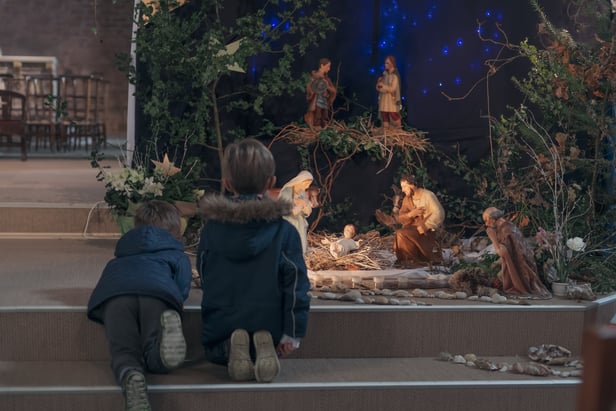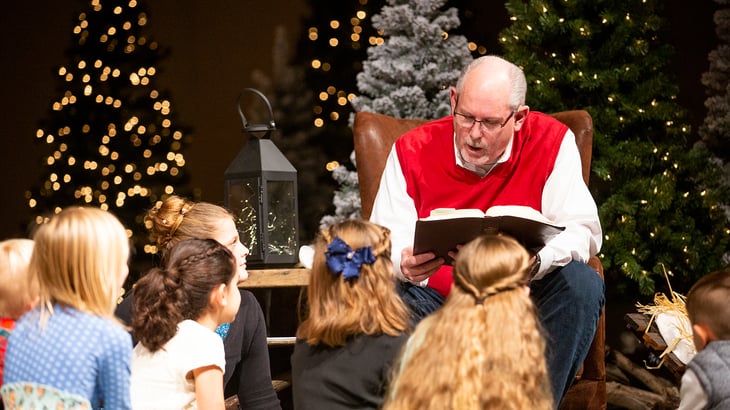The Courage to Forgive
Have you ever wronged somebody? I mean truly wronged somebody. Maybe you yelled at co-workers, gossiped behind a friend’s back (who then found out), or even told blatant lies about someone you had never met. All of these are bad, sinful, but forgiveness is something that God gives us, both in His forgiveness of our sins and in our ability to forgive others.
The Christmas Season as Outreach for Your VBS
As a child, the sounds of bells and Christmas carols, the smells of pine and cookies, and the love of Christ in the air are all things I loved about the holidays. My top three memories of growing up at church were the Christmas service, the Easter service, and Vacation Bible School. Why were these events more impactful to me than any other church service or lesson? It could be that they were all held are during a school vacation, during which I had extra time to spend with family and friends. It could be that these are all times when families in the church come together to celebrate our Savior. Or it could be because all of these events are filled with stories and lessons of who Jesus is and what He did for us. So what does Christmas and the nativity have to do with Vacation Bible School? EVERYTHING! The lessons and stories that are taught during VBS, Easter, Advent, and Christmas will follow children throughout their lives.
Teaching Moments and Retelling Scripture
Have you ever tried to explain Jesus’ family to a preschooler? It’s pretty fun. You get out a picture of Mary and Joseph with baby Jesus. You have this perfect little picture of Jesus with His mom and … hold on. You’re about to say dad, but you realize that’s kind of true and kind of … not true? And voilà. You’ve just taught the children about blended families without having any intention of doing so. Or at least, that wasn’t my own original intention as I stumbled upon this discussion my first year of teaching.
Some might call that a rookie mistake, but I like to think of it as a great example of why it’s valuable to read stories of Scripture over and over again. Here’s why.
Family-Centered Outreach through Christmas Eve Service
Over the past two decades, I have been on the hunt for a special Christmas gift to give! I happen to be a “gifts” person, and I love to receive incredible gifts just as much as I love to give them to others. I have also been blessed to serve God within a congregation as a paid vocation, and I have been the recipient of God’s incredible grace given to all of us through the gift of Jesus.
The blog title gives away the object of my quest, so I will cut to the chase. I have been on the hunt for a beautiful expression of the Gospel within a Christmas Eve service that proclaims the saving Gospel message clearly to congregation members and first-time church attenders alike. I have been searching for a meaningful way to incorporate children into the service without the disruption a normal children’s message can sometimes cause. One option would be a formal Christmas program, but in the communities where I have served, there isn’t space in the family calendar for the practices and memorizing. Such a quandary!
Teaching Parables: A House Divided
Jesus frequently performed miracles in the course of His earthly ministry. Mark 3 contains a couple examples of note. Jesus was near the synagogue on the Sabbath. Our Lord’s detractors were keeping a close vigil in hopes of catching Jesus in sin. Jesus taught with authority in the synagogue, yet He was often rejected by the Jewish religious authorities. Jesus healed many, including the man with the withered hand, and when evil spirits encountered Him, they cowered in fear. The scribes claimed He was possessed by a demon. Even our Lord’s family believed He was deranged.
In this context, accused of devilry, our Savior cleverly presents the parable of the house divided.
Simple Ways to Pass Down the Faith to Your Children
As a DCE, preschool teacher, and mother, I often ask myself, “How can I possibly pass on everything there is to know and understand about the Bible?” When I look at the whole table of options, I find myself staring at the table, frozen with the feeling of being overwhelmed and stuck, not knowing where to even begin. The responsibility of passing on the faith, as a professional or a parent, can at times be overwhelming.
Engaging Your Congregation in Sunday School
You see members of your congregation regularly attending worship and being active within their small groups and social circles, but are they thinking of or active with the children growing in Jesus’ love during Sunday School? Does it even matter? Shouldn’t the parents be involved with their children and not have to “bother” the congregation members? Of course, parents should be involved with their child’s faith, but it is also important to have your congregation members engaged as well. It can help parents feel connected to the church community, strengthen relationships across generations, and, most important, help students grow in their faith (and many times, the members as well!).
So now what? How do you start engaging your members with your Sunday School? The following are a few ideas to help involve your congregation with Sunday School.
Teaching Parables: The Faithful Servant
This parable is both Law and Gospel. It’s an admonition to be ready for Jesus’ return at the end of human history, but it is also the Gospel message that Jesus makes us ready for His triumphant return—the day He will make us whole in heaven.
How to Engage Parents with Your Sunday School
As you say goodbye to your students and watch them walk down the hall, hand in hand with their parents, do you ever wonder: Are they discussing the Bible with their kids? Are the lessons I am teaching being reinforced at home? Am I engaging my students’ parents enough?
Discussing Scary Things with Young Children
As a student at Concordia University, Nebraska, I enjoyed attending chapel services on campus. Nearly ten years later, I still remember some significant messages I heard there. In particular, I remember when a professor shared that he had been in a car accident. Thankfully, no one involved had been hurt. As he would tell people about the close call, many responded by saying, “God is good,” which is, of course, true. This professor wanted to make it clear, however, that even if he had gotten hurt in the accident, that statement would still be true. God is always good, not just when we are blessed to avoid hurt or injury.
























